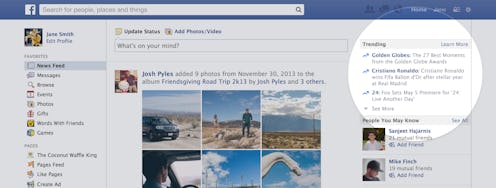
In a bid to stay ahead of Facebook's social-networking rivals, Mark Zuckerberg and co have rolled out a trending topics section on Facebook that will show users which topics are gaining buzz, and why. The new section will appear in the top right-hand corner of News Feeds, and will initially be available in the U.S., the U.K., India, Canada, and Australia, with plans to go mobile at a later date.
The new feature will allow for more user engagement on the website, which now trails in popularity behind Twitter and Instagram. Even the teenagers don't think it's cool anymore.
"Today we're announcing Trending, a new product that's designed to surface interesting and relevant conversations in order to help you discover the best content from all across Facebook," Chris Struhar, engineering manager at Facebook, wrote on the company blog.
While the new trending section will highlight the most buzzworthy and Internet-friendly stories and translate them to Facebook — think Nelson Mandela's death, the TV series 24, the soccer player Cristiano Ronaldo — it will also be a personalized list for users, showing the most relevant content for them.
The move appears to be an attempt to capture some of Twitter's magic: an example on the Facebook blog highlights the Golden Globes as a recent trending topic, and pulls related sources into one feed featuring Facebook content from ABC News to Kelly Osbourne.
Facebook announced the the Trending feature last summer and allowed users to start using Twitter-style hashtags to organize the conversation. The new trending feature does not use hashtags, and will offer each user three trending topics and a short description on why its popular.
In an interview with the New York Times, Struhar said the trendiness of a topic is based on the clout of the people commenting on it, the amount of user engagement, and the time since the topic became popular on Facebook.
While Facebook has been trying to do some good in the world by adding a donate button to select non-profits, making it easier for users to give money to their favorite causes, the social network has become increasingly unpopular among teens and continues to alienate users.
"Accidentally" making private messages public isn't the best way to go about winning back fans, and neither is inserting annoying video ads into already ad-clogged feeds. The social network recently made a $3 billion offer to acquire young whippersnappers Snapchat, which Snapchat rebuffed, plus Facebook has lost an estimated 11 million high school and college-aged users since 2011.
But it ain't dead yet: Facebook has over 1 billion monthly users and over 700 million daily users, 80 percent of whom are in the U.S. and Canada.
Image: Facebook